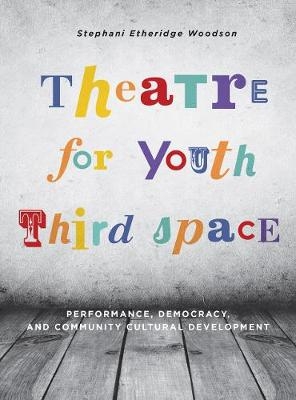
Theatre for Youth Third Space
Intellect Books (Verlag)
978-1-78320-531-8 (ISBN)
Stephani Etheridge Woodson directs the MFA and PhD programs in Theatre for Youth in the School of Film, Dance and Theatre at Arizona State University.
Acknowledgments
Foreword—Michael Rohd
Introduction
Section 1: Field Building—or—the Twenty Principles of TFY Third Space
1.1 TFY Third Space
1.2 Public Art and Communities of Belonging and Location
1.2.1 Words over Water
1.2.2 River Then, River Now, River Future
1.3 Children and Youth
1.4 Further Defining “Public”
1.5 Placemaking as a Function of Public-Making
1.5.1 Physical Space and Social Place
1.5.2 Placemaking
1.6 Community Cultural Development
1.7 Deliberative Democracy and the Politics of Representation
1.8 Defining Community
1.9 A Pause to Build Field Theory in CCD with Children and Youth
1.10 A Brief Introduction to Capital and Cultural Economies
1.11 Expanding Capital Systems
1.12 Defining Development
1.12.1 Positive Youth Development
1.12.2 Defining Development within the Capabilities Approach
1.13 Good Work 73
1.14 Field Theory in CCD with Children and Youth, Part 2: Linking Capital and Development
Section 2: Ethics, Leadership, and Facilitation
Introduction
2.1 Starting From Where You Are: Ethics and Pluralism
2.2 Culture, Values, and Beliefs
2.3 Diversity and Difference
2.4 Power and Status
2.5 Hegemony
2.6 Putting Ethics and Pluralism Together
2.7 Authentic Leadership
2.7.1 Openness and Emotional Honesty
2.7.2 Lateral Management Structures
2.7.3 Reciprocity
2.8 Healthy Ensembles
2.8.1 Dialogue and Positive Communication
2.9 Fostering Creativity
2.9.1 Domains, Fields and Circulating Symbolic Meanings
2.9.2 Individual Creativity
2.9.3 Raw Materials and Group Creativity
2.9.4 Creative Processes
2.10 Theatre and Performance Skills
2.11 Facilitating Creative Processes and Products
2.11.1 Studio as a Space of Games and Play
2.11.2 Spiral Devising
2.11.3 Compositional Practices and Aesthetic Considerations
Section 3: Partnering, Project Management, Planning, and Evaluating Thinking through Community
3.1 Partnering to Foster Change and Social Transformation
3.2 Barriers to Working Together
3.3 Qualities Helpful to Overcoming Barriers
3.4 Conceptualizing Projects
3.5 Project Frames
3.6 Articulating a Theory of Social Change
3.6.1 Reeler’s “Emergent Change”
3.6.2 Reeler’s “Transformative Change”
3.6.3 Reeler’s “Projectable Change”
3.7 Project Planning, Proposals, and Management
3.7.1 Project Planning
3.7.2 Proposal Components
3.7.3 Project Proposal Example
3.7.4 Project Management
3.8 Documentation, Evaluation, and Assessment
3.8.1 Documentation
3.8.2 Specialized Research Terminology
3.8.3 Rigor
3.9 Final Project/Partnership/Program Reports
Works Cited
| Reihe/Serie | Theatre in Education |
|---|---|
| Sprache | englisch |
| Maße | 178 x 229 mm |
| Gewicht | 431 g |
| Themenwelt | Literatur ► Lyrik / Dramatik ► Dramatik / Theater |
| Kunst / Musik / Theater ► Theater / Ballett | |
| Sozialwissenschaften ► Pädagogik | |
| ISBN-10 | 1-78320-531-8 / 1783205318 |
| ISBN-13 | 978-1-78320-531-8 / 9781783205318 |
| Zustand | Neuware |
| Informationen gemäß Produktsicherheitsverordnung (GPSR) | |
| Haben Sie eine Frage zum Produkt? |
aus dem Bereich


